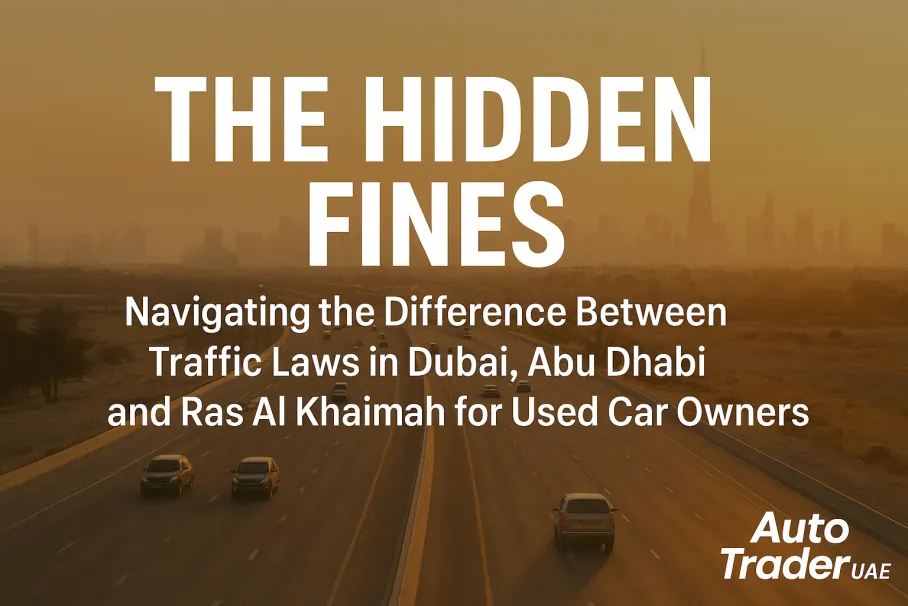The Hidden Fines: Navigating the Difference Between Traffic Laws in Dubai, Abu Dhabi, and Ras Al Khaimah for Used Car Owners
Owning a used car in the UAE offers incredible value and flexibility — but it also means understanding the fine print of each emirate’s traffic laws. What many drivers don’t realize is that Dubai, Abu Dhabi, and Ras Al Khaimah each have slightly different rules, penalties, and enforcement systems, especially when it comes to speed limits, tinting, and off-road regulations. These differences can lead to unexpected fines — and confusion — for used car owners who regularly drive between emirates.
Let’s break down what you need to know before your next road trip across the UAE.
1. Speed Limits and Cameras: Subtle Differences, Big Impact
- Dubai: The RTA enforces a strict network of smart radars with minimal tolerance. Most roads have a 20 km/h buffer, but new AI cameras can detect even minor infractions in school and residential zones.
- Abu Dhabi: The speed buffer was removed in 2018, meaning a posted 120 km/h limit means exactly that. Many visitors from Dubai get caught out by this difference, racking up AED 300–600 fines.
- Ras Al Khaimah (RAK): While generally more relaxed, RAK’s police have installed new cameras on highways like Emirates Road (E611). The fines are similar to Dubai’s — AED 300 for 20 km/h over — but fewer hidden cameras make enforcement less aggressive.
Tip: Always check your car’s GPS for the speed limit and assume no buffer when crossing into Abu Dhabi.
2. Window Tinting Laws: A Shade Too Dark Could Cost You
Window tinting is one of the most common reasons used car buyers face unexpected penalties.
- Dubai: Maximum legal tint is 50% for private vehicles.
- Abu Dhabi: Also 50%, but commercial or company-owned cars often face stricter enforcement.
- RAK: Similar limit, but inspection officers tend to measure tint manually — which can cause discrepancies during renewal.
Before buying a used car, ask for the tint certificate from the previous owner. RTA-approved inspection centers will flag excessive tinting during the registration process.
3. Parking and Salik Variations
- Dubai: Most parking zones are paid 8 AM–10 PM, including Fridays in commercial areas. The Salik system (toll) automatically deducts from your balance, and fines apply for insufficient funds.
- Abu Dhabi: Parking is managed under Mawaqif, and hours differ by area — often 8 AM–12 AM. No Salik here, but Darb toll gates apply during peak hours.
- RAK: Parking is generally free outside city centers, and there are no toll gates — a relief for weekend travelers from Dubai.
If you own a used car and commute between emirates, install both Salik and Darb apps to avoid missed payments and automatic fines.
4. Vehicle Modifications and Off-Road Rules
Used 4x4 owners love to customize their rides — but the rules vary sharply:
- Dubai: The RTA requires approval for lift kits, exhaust changes, and off-road bumpers. Unapproved mods can lead to fines up to AED 1,000 and vehicle impoundment.
- Abu Dhabi: More lenient with off-road vehicles, especially in desert zones, but still requires Emirates Vehicle Gate (EVG) approval for major modifications.
- RAK: Popular for dune and mountain trails — police often allow temporary mods, but driving modified cars on public roads without clearance remains illegal.
If you buy a used modified 4x4, ensure the paperwork reflects RTA or EVG approval before registration.
5. Transferring Fines Between Emirates
Fines issued in any emirate are linked to your plate number nationwide. However, if you purchase a used car from another emirate, make sure:
- All fines are cleared before transfer.
- You check the TAMM (Abu Dhabi), RTA (Dubai), and MOI (Federal) portals for outstanding penalties.
Failure to do so may delay registration or renewal — a common headache for buyers who skip the fine check.
Final Thoughts
While driving across Dubai, Abu Dhabi, and Ras Al Khaimah feels seamless, the laws and enforcement standards are not identical. Understanding these differences can save you hundreds of dirhams in fines — and a lot of frustration. Always verify fines through official portals and make sure your used car complies with the rules in the emirate where it’s registered.
Explore More:
- Dubai Speeding Fines and Black Points | Auto Trader UAE
- Tips to Avoid Traffic Fines and Ensure Smooth Commute - Auto Trader UAE
Final Paragraph
Whether you’re buying a used car, SUV, or 4x4, knowing local traffic laws can make ownership smoother and more affordable. To find RTA-approved and fully inspected used cars in Dubai, visit Auto Trader UAE — your trusted destination for used cars for sale in Dubai with verified listings, expert insights, and the latest automotive updates across the UAE.

